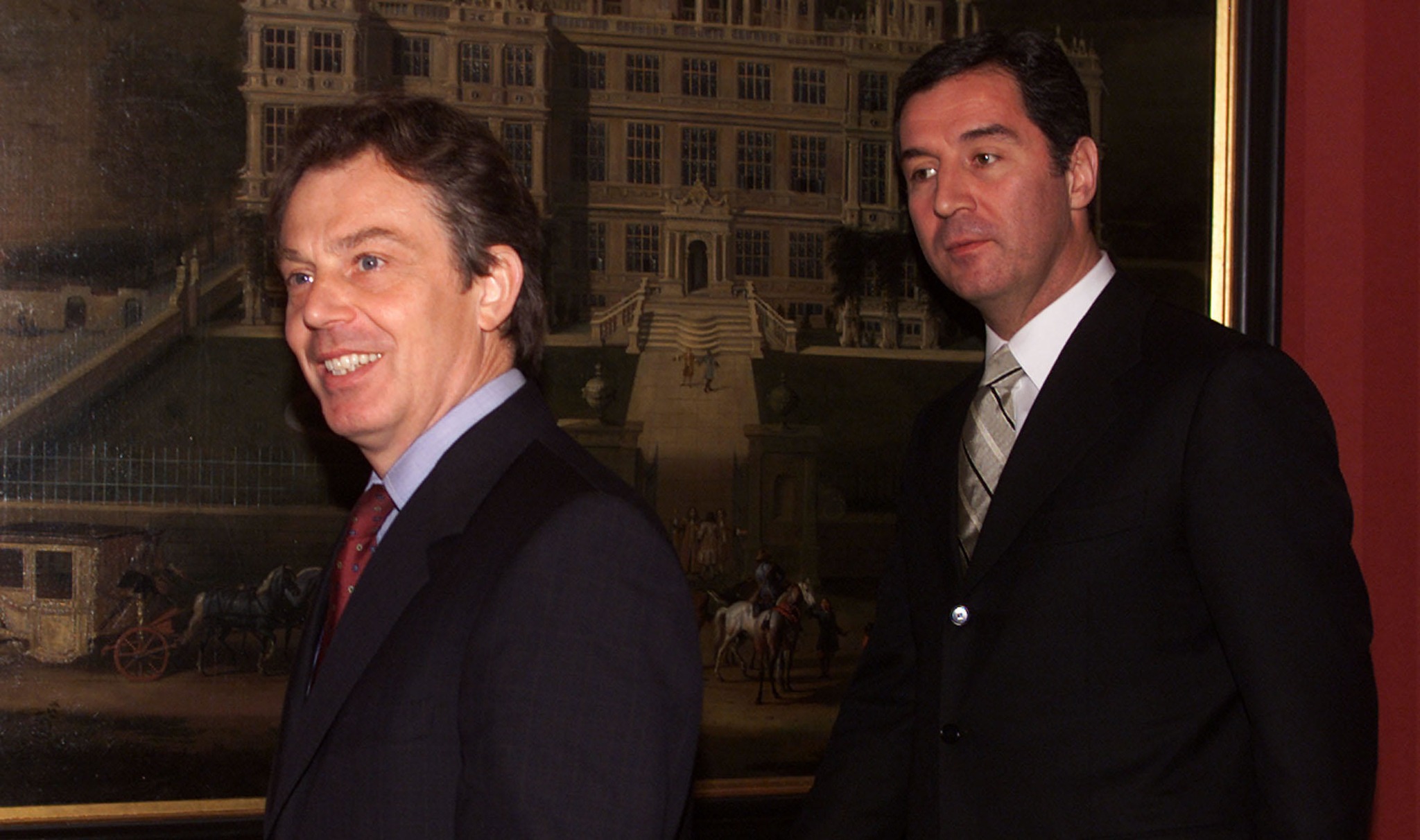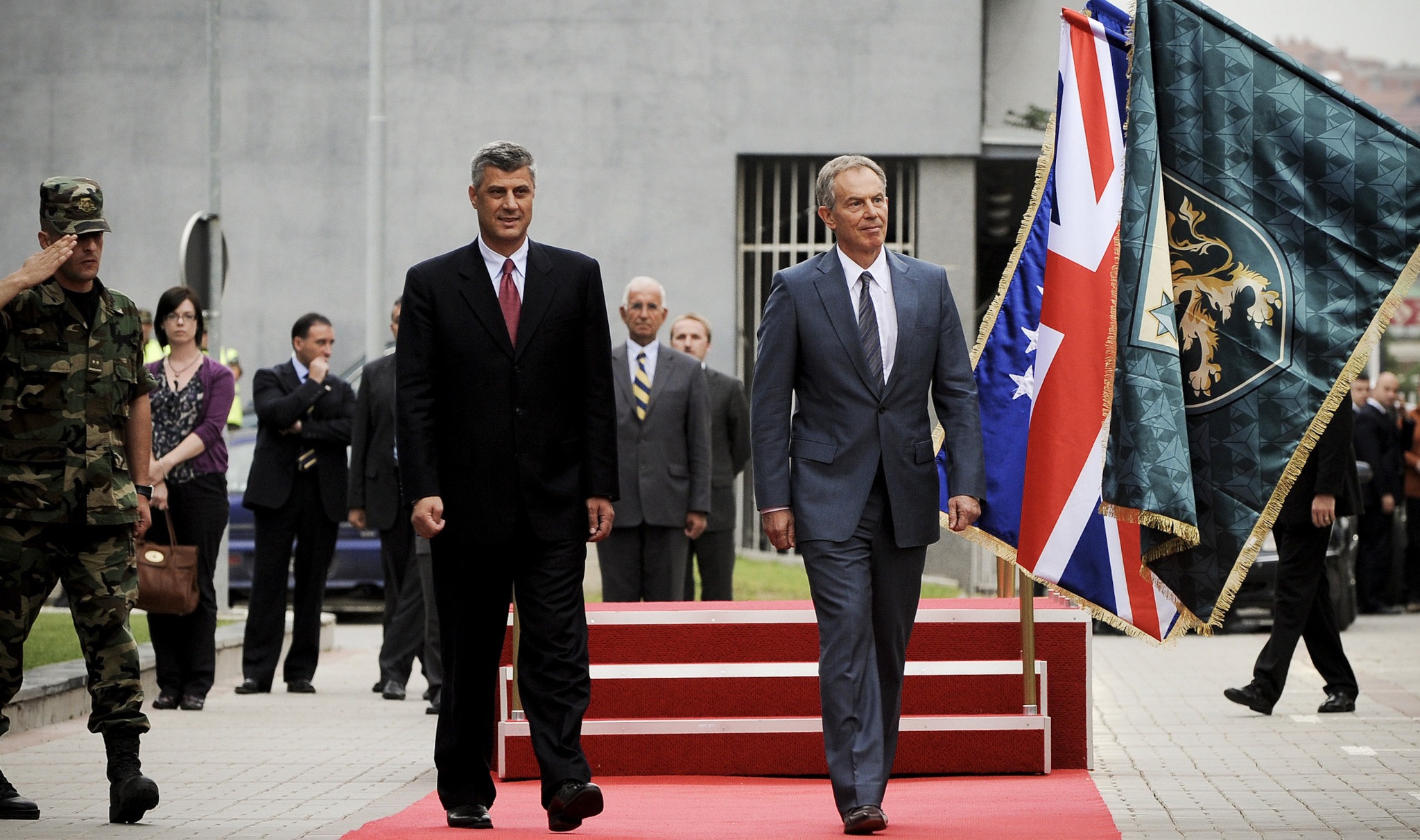NATO WAR ON SERBIA 1999
Britain’s attorney general secretly warned Blair against NATO strikes on civilian targets during Kosovo war, newly released files reveal.
DECLASSIFIED. UK
15 August 2024

The TV station bombed by NATO. (Photo: EQRoy / Alamy
Twenty five years ago, NATO bombed the main studio of Yugoslavia’s state-owned broadcasting company, Radio-Television Serbia (RTS).
The attack at 2am on 23 April 1999 came amid Bill Clinton and Tony Blair’s “humanitarian intervention” in Kosovo.
Officially they wanted to stop Serbian president Slobodan Milosevic massacring ethnic Albanians during the breakup of Yugoslavia.
But 16 media workers were killed and 19 injured in the strike on RTS, which remains the single most controversial event in NATO’s 78-day military campaign.
Speaking at a NATO summit the next day, Blair insisted that bombing the television station was “entirely justified” since it was “part of the apparatus of dictatorship and power of Milosevic”.
Human rights and media organisations disagreed.
Amnesty International condemned the attack as a “war crime”, while the National Union of Journalists described it as “barbarity”.
Declassified files now reveal that Blair was privately warned by Britain’s most senior lawyer about bombing civilian targets including the RTS building.
The documents, released to the National Archives last month, suggest Blair misled the British public over the legitimacy of NATO’s military operations in Yugoslavia.
War aims
Britain’s attorney general John Morris issued a “secret and personal” memorandum to Blair just hours after the bombing of the RTS studio.
“I have hesitated before minuting you personally on the legal aspects of our policy on Kosovo”, he wrote.
But Morris, alongside the legal advisers to the UK’s foreign and defence secretaries, had become concerned that NATO “could lose sight… of the legal constraints which necessarily apply to our action” in Yugoslavia.
It was “not clear” to Morris, for instance, how targets such as “radio and TV stations” related to the “relief of humanitarian need in Kosovo” – even “assuming they are lawful targets”.
Without a UN Security Council resolution, the US and Britain had justified armed intervention in Yugoslavia with reference to averting a humanitarian catastrophe.
To this end, Morris argued that it would be “a pity” if NATO’s bombing raids “gave the appearance of placing the objective of crushing or humiliating Milosevic above the objective of relieving humanitarian need”.
Morris’ concerns were not ill-placed. Earlier in April, Blair had privately confessed that “we are moving towards a situation where our aim will become removing Milosevic”, as revealed by The Grayzone.
“We will not want to say so now, but autonomy for Kosovo inside Serbia is becoming absurd. And plainly Milosevic will threaten the stability of the region as long as he remains”, Blair continued.
RELATED

When Tony Blair Bombed Montenegro
15 August 2024

The TV station bombed by NATO. (Photo: EQRoy / Alamy
Twenty five years ago, NATO bombed the main studio of Yugoslavia’s state-owned broadcasting company, Radio-Television Serbia (RTS).
The attack at 2am on 23 April 1999 came amid Bill Clinton and Tony Blair’s “humanitarian intervention” in Kosovo.
Officially they wanted to stop Serbian president Slobodan Milosevic massacring ethnic Albanians during the breakup of Yugoslavia.
But 16 media workers were killed and 19 injured in the strike on RTS, which remains the single most controversial event in NATO’s 78-day military campaign.
Speaking at a NATO summit the next day, Blair insisted that bombing the television station was “entirely justified” since it was “part of the apparatus of dictatorship and power of Milosevic”.
Human rights and media organisations disagreed.
Amnesty International condemned the attack as a “war crime”, while the National Union of Journalists described it as “barbarity”.
Declassified files now reveal that Blair was privately warned by Britain’s most senior lawyer about bombing civilian targets including the RTS building.
The documents, released to the National Archives last month, suggest Blair misled the British public over the legitimacy of NATO’s military operations in Yugoslavia.
War aims
Britain’s attorney general John Morris issued a “secret and personal” memorandum to Blair just hours after the bombing of the RTS studio.
“I have hesitated before minuting you personally on the legal aspects of our policy on Kosovo”, he wrote.
But Morris, alongside the legal advisers to the UK’s foreign and defence secretaries, had become concerned that NATO “could lose sight… of the legal constraints which necessarily apply to our action” in Yugoslavia.
It was “not clear” to Morris, for instance, how targets such as “radio and TV stations” related to the “relief of humanitarian need in Kosovo” – even “assuming they are lawful targets”.
Without a UN Security Council resolution, the US and Britain had justified armed intervention in Yugoslavia with reference to averting a humanitarian catastrophe.
To this end, Morris argued that it would be “a pity” if NATO’s bombing raids “gave the appearance of placing the objective of crushing or humiliating Milosevic above the objective of relieving humanitarian need”.
Morris’ concerns were not ill-placed. Earlier in April, Blair had privately confessed that “we are moving towards a situation where our aim will become removing Milosevic”, as revealed by The Grayzone.
“We will not want to say so now, but autonomy for Kosovo inside Serbia is becoming absurd. And plainly Milosevic will threaten the stability of the region as long as he remains”, Blair continued.
RELATED

When Tony Blair Bombed Montenegro
‘Serious doubt’
Yet Morris went even further in his letter to Blair, declaring that there was “room for serious doubt about the lawfulness of attacking” economic, political and media targets “whatever our overall objective”.
He continued: “I do not know for example how the… radio and television stations, or the building which housed the Serbian Television Service could have qualified as military objectives”.
NATO did not specify which of its members had taken part in the airstrikes on the RTS building at the time.
But even if Britain had not been directly involved, Morris argued that “the attacks were carried out by the Alliance acting in our name and on our behalf” and “with our full endorsement”.
The New Labour government could therefore expect “close scrutiny from parliament and the British public”.
Blair was also reminded that Britain’s actions could arise for adjudication before the International Court of Justice, the European Court of Human Rights, and the European Court of Justice.
“Litigation in any of these fora would quickly bring under judicial scrutiny the legal justification for our action against Yugoslavia”, Morris warned. “The outcome of that scrutiny cannot be guaranteed”.
In a highly contested ruling, the International Criminal Tribunal for the Former Yugoslavia (ICTY) would later conclude there were no grounds to investigate the bombing of the TV station as a possible war crime.
Milosevic ‘is not losing’
Parallel to the legal warnings, Blair was receiving gloomy reports that NATO could be losing the war.
Paddy Ashdown, then leader of the Liberal Democrats and a former MI6 officer, had visited the Balkans between 18 and 22 April and prepared a briefing for Blair about the situation on the ground.
“It is said that we are winning this war”, Ashdown wrote. “I have, as yet, seen no evidence for that and a great deal of evidence that Milosevic is not losing it”.
He continued: “I am unable to say to what extent his forces have been damaged, especially on the ground in Kosovo – though I have a suspicion that this is less, and progressing less quickly than we like to believe”.
NATO’s air strikes had been hampered by bad weather, reducing visibility over targets.
Ashdown thus recommended that NATO might intensify its military campaign by preparing for a ground invasion and collaborating with the Kosovo Liberation Army (KLA), an ethnic Albanian separatist militia with links to organised crime.
While Blair privately believed that the KLA were “not much better than the Serbs”, Ashdown said “I believe we should take a risk with them”.
He continued: “Crudely, the more we are able sensibly to use them the more effective our air operations will be and the fewer casualties we will take when the ground action starts”.
The insurgent group would effectively act as NATO’s ground force. Its leader Hashim Thaci went on to run Kosovo and is currently standing trial for war crimes in the Hague.
RELATED

On trial for war crimes – Tony Blair’s former allies
Yet Morris went even further in his letter to Blair, declaring that there was “room for serious doubt about the lawfulness of attacking” economic, political and media targets “whatever our overall objective”.
He continued: “I do not know for example how the… radio and television stations, or the building which housed the Serbian Television Service could have qualified as military objectives”.
NATO did not specify which of its members had taken part in the airstrikes on the RTS building at the time.
But even if Britain had not been directly involved, Morris argued that “the attacks were carried out by the Alliance acting in our name and on our behalf” and “with our full endorsement”.
The New Labour government could therefore expect “close scrutiny from parliament and the British public”.
Blair was also reminded that Britain’s actions could arise for adjudication before the International Court of Justice, the European Court of Human Rights, and the European Court of Justice.
“Litigation in any of these fora would quickly bring under judicial scrutiny the legal justification for our action against Yugoslavia”, Morris warned. “The outcome of that scrutiny cannot be guaranteed”.
In a highly contested ruling, the International Criminal Tribunal for the Former Yugoslavia (ICTY) would later conclude there were no grounds to investigate the bombing of the TV station as a possible war crime.
Milosevic ‘is not losing’
Parallel to the legal warnings, Blair was receiving gloomy reports that NATO could be losing the war.
Paddy Ashdown, then leader of the Liberal Democrats and a former MI6 officer, had visited the Balkans between 18 and 22 April and prepared a briefing for Blair about the situation on the ground.
“It is said that we are winning this war”, Ashdown wrote. “I have, as yet, seen no evidence for that and a great deal of evidence that Milosevic is not losing it”.
He continued: “I am unable to say to what extent his forces have been damaged, especially on the ground in Kosovo – though I have a suspicion that this is less, and progressing less quickly than we like to believe”.
NATO’s air strikes had been hampered by bad weather, reducing visibility over targets.
Ashdown thus recommended that NATO might intensify its military campaign by preparing for a ground invasion and collaborating with the Kosovo Liberation Army (KLA), an ethnic Albanian separatist militia with links to organised crime.
While Blair privately believed that the KLA were “not much better than the Serbs”, Ashdown said “I believe we should take a risk with them”.
He continued: “Crudely, the more we are able sensibly to use them the more effective our air operations will be and the fewer casualties we will take when the ground action starts”.
The insurgent group would effectively act as NATO’s ground force. Its leader Hashim Thaci went on to run Kosovo and is currently standing trial for war crimes in the Hague.
RELATED

On trial for war crimes – Tony Blair’s former allies
‘Make it happen‘
Concerned about the slow progress of the war, Blair apparently ignored Morris’ legal advice and set about intensifying NATO’s bombing campaign to degrade Serbia’s economy.
Shortly after the strike on the RTS building, the British plan of action for Kosovo involved streamlining target selection so that “if the main [NATO] players agree, we just make it happen”.
This would look like a “war cabinet i.e. a small group of the big five or six” who would “take critical decisions” on what to bomb.
“All blockages to targets must be removed or the responsibility laid clearly at the door of those blocking”, the file continued.
Hesitant members of the Alliance included Portugal, Canada and Greece, who feared that escalation would result in more civilian casualties.
British plans were also drawn up for the sinking of the Yugoslav navy and the use of special forces in order to “unnerve”, “surprise”, or “deter” Milosevic.
Over the following weeks, on British guidance, NATO forces continued to hit civilian targets in Yugoslavia including Montenegro’s main airport and Belgrade’s iconic Hotel Jugoslavija.
Morris would seemingly go on to regret signing off on the hotel bombing, noting how the legal implications were “too close for comfort”.
Milosevic agreed to withdraw Serb forces from Kosovo on 9 June, after almost three months of fighting, amid threats of a NATO ground invasion.
He was overthrown by pro-democracy protests a year later and died in 2006 while awaiting trial at the Hague. Britain was the first country to recognise Kosovo’s unilateral declaration of independence from Serbia in 2008.
“War is never civilised”, declared a triumphant Blair. “But war can be necessary to uphold civilisation”.
Concerned about the slow progress of the war, Blair apparently ignored Morris’ legal advice and set about intensifying NATO’s bombing campaign to degrade Serbia’s economy.
Shortly after the strike on the RTS building, the British plan of action for Kosovo involved streamlining target selection so that “if the main [NATO] players agree, we just make it happen”.
This would look like a “war cabinet i.e. a small group of the big five or six” who would “take critical decisions” on what to bomb.
“All blockages to targets must be removed or the responsibility laid clearly at the door of those blocking”, the file continued.
Hesitant members of the Alliance included Portugal, Canada and Greece, who feared that escalation would result in more civilian casualties.
British plans were also drawn up for the sinking of the Yugoslav navy and the use of special forces in order to “unnerve”, “surprise”, or “deter” Milosevic.
Over the following weeks, on British guidance, NATO forces continued to hit civilian targets in Yugoslavia including Montenegro’s main airport and Belgrade’s iconic Hotel Jugoslavija.
Morris would seemingly go on to regret signing off on the hotel bombing, noting how the legal implications were “too close for comfort”.
Milosevic agreed to withdraw Serb forces from Kosovo on 9 June, after almost three months of fighting, amid threats of a NATO ground invasion.
He was overthrown by pro-democracy protests a year later and died in 2006 while awaiting trial at the Hague. Britain was the first country to recognise Kosovo’s unilateral declaration of independence from Serbia in 2008.
“War is never civilised”, declared a triumphant Blair. “But war can be necessary to uphold civilisation”.
‘Astonishing’
Morris, who passed away last year aged 91, published a memoir in 2011 which shed more light on his two-year stint as Blair’s first attorney general.
He said the New Labour government “was probably one of the most warlike of modern world governments” with a prime minister “who was ready to commit British troops with a frequency unparalleled in modern times”.
During the whole of his involvement with Kosovo, Morris “never had a personal meeting with Tony Blair”, which he described “as an astonishing state of affairs”. On one occasion at a Cabinet committee, Blair even questioned his “presence and role”.
Blair’s hostility to legal advice, according to Morris, was inspired by a “strong temptation […] to cut corners” and “to keep in line with the Americans”.
“On the great march to victory”, he wrote, “it would be pretty bad form for us to find it difficult to keep up with the others (that is, with the Americans)”.
In hindsight, the former attorney general maintained that “it was extremely doubtful whether” the RTS building “was an appropriate target”.
Morris reflected how the Kosovo campaign had “aged me a little” and found the choice of some targets “troubling”.
“I did not know how the headquarters of political parties, radio and television stations etc, could have qualified as ‘military objectives’,” he remarked.
NATO and Blair were asked to comment.
ABOUT THE AUTHOR

John McEvoy is an independent journalist who has written for International History Review, The Canary, Tribune Magazine, Jacobin and Brasil Wire.VIEW MORE ARTICLES
SEE https://plawiuk.blogspot.com/search?q=KOSOVO
Seeing the Forest for the Trees
Thesis on The Kosovo Crisis and the Crisis of Global Capitalism
(originally written May 1999, Bill Clinton set the stage for George W. to invade Afghanistan and Iraq for humanitarian purposes.)
http://plawiuk.blogspot.com/2005/01/war-whats-it-good-for-profit.html
Seeing the Forest for the Trees
Thesis on The Kosovo Crisis and the Crisis of Global Capitalism
(originally written May 1999, Bill Clinton set the stage for George W. to invade Afghanistan and Iraq for humanitarian purposes.)
http://plawiuk.blogspot.com/2005/01/war-whats-it-good-for-profit.html
No comments:
Post a Comment